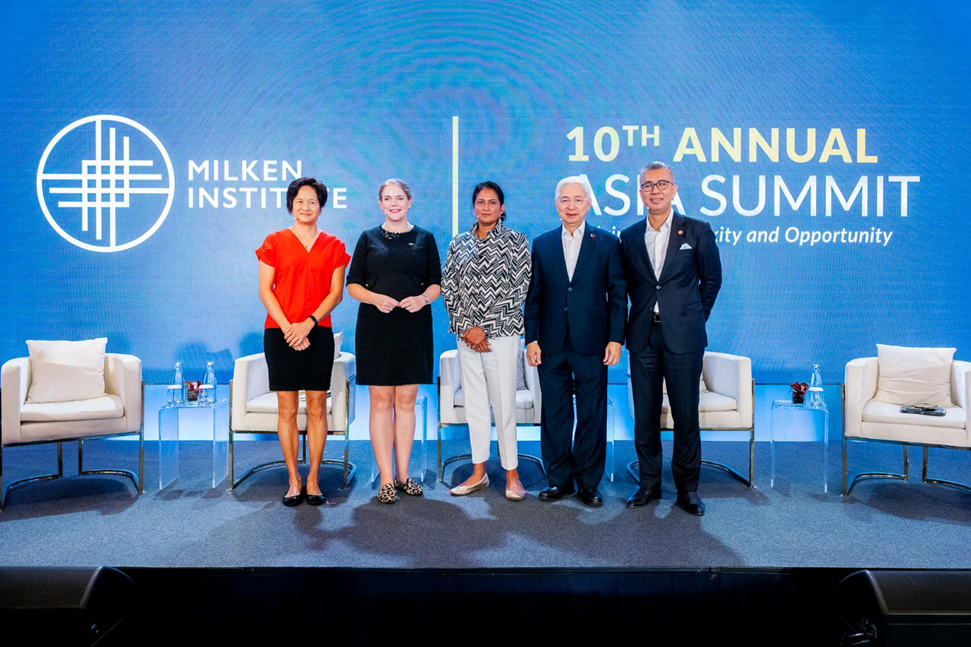
Department of Trade and Industry (DTI) Secretary Alfredo E. Pascual re-emphasized the Philippines' attractiveness as an investment location for foreign-owned businesses, such as in telecom, media and technology among other crucial sectors, during an investors' summit in Singapore.
Pascual tried to convince foreign investors of the country's strategic trade policies and investment priorities during the 10th Milken Institute Asia Summit in Singapore on Sept. 14.
He spotlighted the Philippines as a burgeoning hub for global investments, emphasizing the nation's strategic focus on sectors such as telecom, media, technology, semiconductor, aerospace, and healthcare during the panel entitled "Global Overview: Illuminating Pathways Through Complexities."
He identified these sectors to be the key drivers for the Philippines to enhance its participation in the global value chain.
The DTI chief shared that the Philippines is one of the fastest-growing economies globally in the last two decades, securing a pipeline of big-ticket investments exceeding the initial target under the Marcos administration. Despite facing some setbacks due to various external headwinds, he said that this led the Board of Investments to increase the target from the original $17 billion to $26 billion.
In addition, Pascual stated that the ratification of the Regional Comprehensive Economic Partnership (RCEP), together with the revamped and forward-thinking Philippine Export Development Plan (PEDP), sets the country on a promising path to strengthen its position in the global market.
He additionally noted that the administration is developing industry-specific and firm-centric plans to ensure the country's trade policies develop.
Further, the trade secretary underscored the pivotal role of micro, small, and medium enterprises (MSMEs) in the Philippine economy, referring to them as the "backbone" and "lifeblood" of the country.
“We're doing a lot of things to introduce digitalization in their operations,” the DTI chief cited, highlighting the government's concerted efforts to foster digital transformation.
Pascual said that as part of this digital shift, the DTI launched a Philippine E-commerce Platform to expand the market reach of small businesses, both nationally and globally. He also emphasized the establishment of a center for artificial intelligence, designed to serve the needs of both small and large businesses in optimizing the application of AI in their operations.
He also said the implementation of an Industry 4.0 pilot factory aimed at equipping businesses, especially MSMEs, with the knowledge to integrate new technologies into their operations.
In line with this, he cited that the government is revisiting the legal framework governing Internet transactions through the introduction of the Internet Transaction Act, which seeks to protect consumers and facilitate the participation of small businesses in the digital economy. He linked these to the efforts of harmonizing national regulations with regional and international standards, including the recently launched Digital Economy Framework Agreement in Jakarta.
During the summit, Pascual likewise highlighted the young Filipino population, with a median age of 25 and a significant presence in the IT and business process outsourcing sectors, which stands as a driving force in the nation's transition into the digital economy.
He said the emerging field of cybersecurity as a potential industry presents both a new challenge and an opportunity that should be developed by the government.
“We're trying our best to develop the capability of our young population," said Pascual.
Meanwhile, the DTI chief highlighted the proactive strategy of the government in pursuing free trade agreements (FTAs), including the recently concluded one with South Korea, as part of the country’s broader strategy to expand its market access, particularly for exports.
He stated that the administration is optimistic on its goal of becoming a middle-income country in the next two to three years.
In addition to trade and investment efforts, he affirmed that the government remains dedicated to ensuring food security for the Filipino population. Through the DTI’s Three-Year Food Logistics Action Agenda, the current administration aims to reduce the friction from farm gate to the consumer to ensure the availability, accessibility, and affordability of food for Filipinos.
“The Philippines warmly welcomes businesses and investors. Our trade policies are designed to facilitate a secure and seamless exchange of goods and services, emphasizing critical aspects like consumer protection, privacy, and intellectual property rights. Through collaboration between the public and private sectors, we can create a harmonized and cohesive global trade environment," said Pascual.
The summit discussion centered mainly on the new opportunities and complexities emerging in the global post-pandemic period, with a focus on driving success, innovation, and rebuilding a spirit of global collaboration.
The Milken Asia Summit is a prestigious event attracting influential global leaders, policymakers, industry experts, and financial experts to discuss future Asia and the world. (Ma. Joselie C. Garcia)